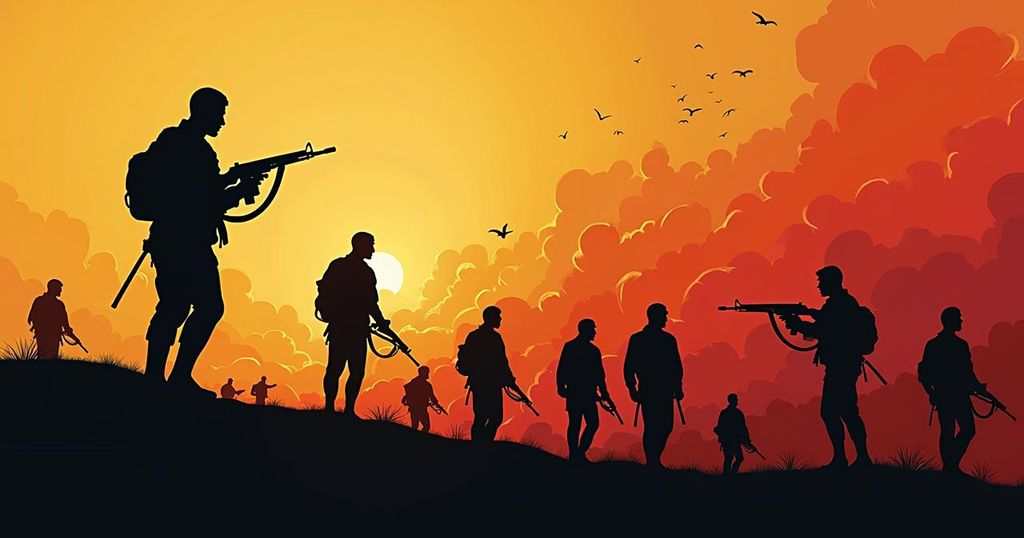The assassination of Hezbollah leader Hassan Nasrallah by Israeli forces signifies a serious escalation in conflict, with major implications for Hezbollah’s strategy, Iran’s response, and Israel’s military objectives. Hezbollah is likely to maintain its offensive against Israel, while Iran may direct allied militias to increasing attacks in retaliation. Israel intends to press its military advantage, understanding that achieving comprehensive security from Hezbollah will likely require ground operations, raising the stakes for all parties involved.
The assassination of Hassan Nasrallah, the long-time leader of Hezbollah, by Israeli forces marks a significant escalation in the ongoing conflict between Israel and the Lebanese militant organization. This incident is poised to intensify tensions throughout the region, potentially involving Iran and the United States in what could escalate into a broader and more destructive conflict. As a critical development in the geopolitical landscape, the immediate consequences of Nasrallah’s death hinge on the responses of Hezbollah, Iran, and Israel. Hezbollah, reeling from repeated strategic blows, including the loss of its top command and the deterioration of its communication systems, finds itself in a precarious position. Security analyst Mohammed Al-Basha notes, “The loss of Hassan Nasrallah will have significant implications, potentially destabilising the group and altering its political and military strategies in the short term.” Nonetheless, it is unlikely that Hezbollah will concede defeat or seek peace on terms favorable to Israel. The group has vowed to continue its resistance, leveraging its remaining cadre of fighters, including many seasoned veterans from conflicts in Syria. Reports indicate they possess a considerable stockpile of precision-guided missiles capable of striking major Israeli cities. Should they opt for a decisive offensive, the expectation of a catastrophic Israeli response looms heavily, with the potential for devastating consequences in Lebanon, or even retaliatory actions directed toward Iran. On the other hand, Iran’s reaction is paramount, as the assassination deals a significant blow to its influence and strategy within the region. The Iranian government has declared five days of mourning and has reportedly heightened security measures around its leadership. Hardline factions within the Iranian regime may be compelled to consider retaliatory actions to salvage perceived honor. Iran is well-equipped with a network of allied militias across the Middle East, known as the “Axis of Resistance, ” which includes groups such as the Houthis and militant factions in Iraq and Syria. Targeted responses may be anticipated, aimed at maximizing pressure on both Israel and American interests in the area, while carefully avoiding an outright war, which Iran may not be able to sustain. In light of these developments, Israel is underscoring its commitment to an offensive strategy rather than ceasing operations during the proposed ceasefire period. Israeli military assessments suggest that Hezbollah is currently vulnerable; thus, Israel seeks to capitalize on this advantage to dismantle the militant organization’s capabilities permanently. Achieving such an objective, however, would likely necessitate a ground invasion, a move recognized by both military strategists and Israeli leaders as fraught with complexity. Historical precedent indicates that while entry into Lebanon might be manageable for the Israel Defense Forces, withdrawal could prove prolonged and challenging, reminiscent of the Israel’s experiences in Gaza. In conclusion, the aftermath of Hassan Nasrallah’s assassination by Israeli forces catalyzes a series of critical strategic decisions for Hezbollah, Iran, and Israel. Each entity’s response will shape not only their immediate future but also the broader stability of the Middle East. The potential for escalating conflict remains high, emphasizing the need for vigilant observation of the unfolding dynamics in this volatile region.
The context of this analysis centers on the assassination of Hassan Nasrallah, a pivotal figure in the Lebanese militant group Hezbollah, by Israeli forces. This significant event occurs amid a prolonged conflict between Israel and Hezbollah, which has seen various levels of violence and military engagements over the years. Tensions in the region are compounded by Iran’s support for Hezbollah, positioning it as a critical player in the geopolitical landscape. The interactions between these parties have important implications for regional stability and the potential involvement of external actors, particularly the United States.
The assassination of Hassan Nasrallah has triggered a critical turning point in the already tense relationship between Hezbollah, Iran, and Israel. Each group’s next steps will significantly impact the trajectory of conflict and the possibility of broader regional instability. Hezbollah’s commitment to resistance against Israeli aggression, Iran’s potential for retaliatory measures through allied militia forces, and Israel’s intentions to neutralize threats posed by Hezbollah all point to an uncertain and volatile future.
Original Source: www.bbc.com






